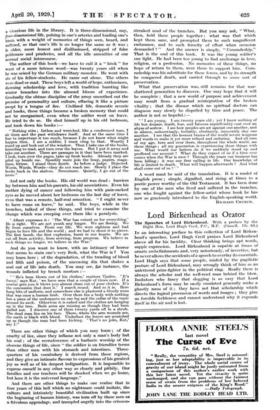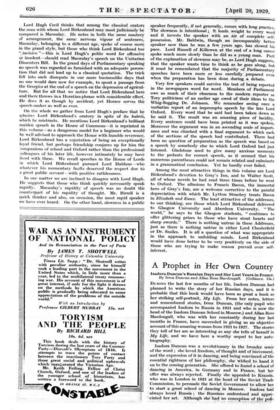Lord Birkenhead as Orator
The Speeches of Lord Birkenhead. With a preface by the Right Hon. Lord Hugh Cecil, P.C., M.P. (Cassell. 12s. 6d.)
IN an interesting preface to this collection of Lord Birken- head's speeches, Lord Hugh Cecil praises Lord Birkenhead above all for his lucidity. Clear thinking brings apt words, supple expression. Lord Birkenhead is capable at times of ornate embellishments and, very notoriously, of invective, but he never allows the accidents of a speech to overlay its essentials. Lord Hugh says that some people, misled by the pugilistic posture of Lord Birkenhead, may wrongly think of him as an unlettered prize-fighter in the political ring. Really there is always the scholar and the well-read man behind the blow. Imitators who fancy that slogging is so easy that Lord Birkenhead's form may be easily emulated generally make a ghastly mess of it ; they have not that scholarship which directs the logical procession of words and images ; they give us forcible feebleness and cannot understand why it expends itself in the air and is lost. Lord Hugh Cecil thinks that among the classical oratorS the man with whom Lord Birkenhead may most judiciously be compared is Macaulay. He notes in both the same mastery of arrangement, the saw. nervous vigour of sentences; Macaulay, belonging to a different age, spoke of course more in the grand style, but those who think Lord Birkenhead too incisive "—this is 'Lord Hugh's polite word for offensive or insolent—should read Macaulay's speech on the Unitarian Dissenters Bill. In the grand days of Parliamentary speaking no speech was regarded as furnished with an adequate perorar tion that did not lead up to a classical quotation. The trick fell into such disrepute in our more businesslike days that no one would dare now for example, to spout a passage from the Georgics at the end of a speech on the depression of agricul- ture. But for all that we notice that Lord Birkenhead here and there throws in a Horatian phrase with considerable effect. He does it as though by accident, yet Horace serves the speech-maker as well as ever.
On the whole we gather from Lord Hugh's preface that he admires Lord Birkenhead's oratory in spite of its hubris, which he mistrusts. He mentions Lord Birkenhead's brilliant maiden speech in the House of Commons—it is reprinted in this volume—as a dangerous model for a beginner who would be well advised to approach the House with humble reverence.
Lord Birkenhead has a reputation of being an exceptionally loyal friend, but perhaps friendship conjures up for him the f...ompanions of school and Oxford rather than the professional 3311eagues of his later life, however intimately he may have lived with these. We recall speeches in the House of Lords
in which Lord Birkenhead pursued Lord Haldane—who whatever his momentary faults deserved the respect due to a great public servant—with positive ruthlessness.
In one matter we are inclined to disagree with Lord Hugh.
He suggests that those who think quickly necessarily speakrapidly. Macaulay's rapidity of speech was no doubt the
Counterpart of his rapidity of thought. Mr. Birrell is it quick thinker and also, on occasion, the most rapid speaker we have ever heard. On the other hand, slowness in a public speaker frequently, if not generally, comes with long practice. The slowness is intentional ; it lends weight to every word and it invests the speaker with an air of complete self- possession. Mr. Baldwin, though an incomparably better speaker now than he was. a few years ago, has slowed his pace. Lord Russell of Killowen at the end of a long career spoke much more slowly than he did as a young man. Part of the explanation of slowness may be, as Lord Hugh suggests, that the speaker wants time to think as he goes along, but it must be remembered that the majority of Parliamentary speeches have been more or less carefully, prepared even when the preparation has been done during a debate.
Very few speakers could survive the test of being reported in the newspapers word for word. Members of Parliament owe as much of their clearness to the modern reporter as Tory politicians of an earlier age owed of their ideas to the Whig-flogging Dr. Johnson. We remember seeing once a verbatim report of an impromptu speech by the late Lord Oxford. Every word that he said had been taken down as he said it. The result was an amazing piece of lucidity. Every sentence could have been printed as it was spoken, Moreover the argument was in an ascending scale of import- ance and was clinched with a final argument to which each of the sections of the speech had contributed. There had been no question of preparation as the speech was based on a speech by somebody else to which Lord Oxford had just listened. Gladstone used to give many anxious moments to the pedants for correct speech, as it seemed that his numerous parentheses could not remain related and culminate in a grammatical conclusion. Yet he hardly ever failed.
Among the most attractive things in this irolume are Lord Birkenhead's devotion to Gray's Inn, and to Walter Scott, all of whose novels he had read three times before he went to Oxford. The allusions to Francis BacOn, the immortal hero of Gray's Inn, are a welcome corrective to the painful depreciation with which Mr. Lytton Strachey treats Bacon in Elizabeth and Essex. The least attractive of the addresses, to our thinking, are those which Lord Birkenhead delivered to Glasgow University and Aberdeen University. " The world," he says to the Glasgow students, " continues to offer glittering prizes to those who have stout hearts and sharp swords." There is nothing untrue in these Addresses, just as there is nothing untrue in either Lord Chesterfield or Dr. Smiles. It is all a question of what was appropriate in the approach to unfolding minds. Lord Birkenhead
would have done better to be very positively on the side of those who are trying to make reason prevail over self- interest.

























































 Previous page
Previous page